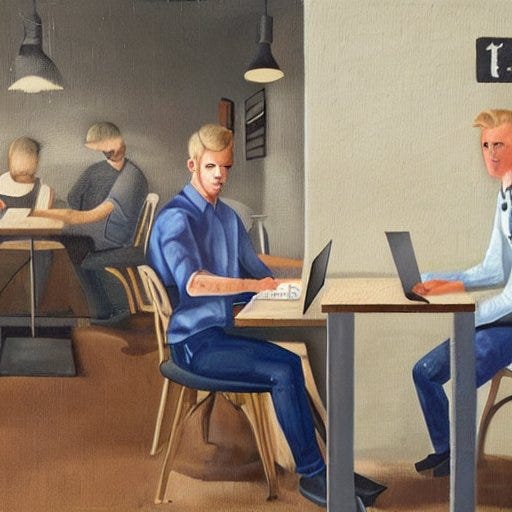How I learned to to work hard again 10,000 meters up the sky
How to change your relationship to a word
Hi friend,
Hope you’re doing well.
I’m writing today’s edition from a Sandwich place in Barcelona with industrial walls, wooden interior, and 3 handsome men sitting next to me.
But last Wednesday, I was still in Stockholm.
I cooked my poké bowl for lunch while listening to Lex Friedman’s podcast with Sam Altman.
In case you don’t know Sam:
He’s the CEO of OpenAI, extremely smart, overwhelmingly wealth, and loves to watch “The Bachelor”.
What?! We’re trusting a fan of The Bachelor to build the most important technology of our lifetime?!
…
Well, in either case, Friedman referenced Altman’s blog as one of the best resources on the internet for startup.
So I gave it a visit and read his essay “How to become successful” three times.
One part stuck out to me while reading:
“You can get to about the 90th percentile in your field by working either smart or hard, which is still a great accomplishment. But getting to the 99th percentile requires both”
I wrote down the quote in my workbook.
But it wasn’t before my plane to Barcelona reached cruising attitude at 7:30am one day later that I started to reflect.
10,000 meters up in the sky, I grabbed my journal.
I thought:
I’m a big fan of working smart.
But I don’t want to work hard though.
But why?
Journaling about it, I realised “hard work” resembled stressed and overworked middle-aged parents working 10-12 hours a day for me.
This hasn’t annoyed me before.
Not everyone has to be a hard worked.
But reading Sam Altman’s blog reminded me of something:
Believing “hard work is bad” doesn’t help me in any way, because I’ll need to work hard to achieve my goals in either case.
So I attempted to redefine the term:
My old belief:
“Bad” hard work = Working many hours and neglecting other areas of your life, working hard for the sake of working hard, or working hard to cope with problems
My new belief:
“Good” hard work = Leaning into discomfort to get to where you want to be as fast as possible, without compromising other life priorities
The old definition of hard work caused me stress.
The new one felt sustainable.
Later, I landed in Barcelona and met up with 4 friends from the Twitter business space.
All of them have online businesses, are into personal development, and love to eat steak.
At the time of writing, I’ve spent 3 days with these amigos.
And I realised we all share 2 superpowers:
Unlimited steak-eating abilities
We went to an all-you-can-eat restaurant and literally ate so many steaks that they had to take it off the menu.

We’re able to re-label things
Label-ing something means assigning it a (positive or negative) meaning.
Whenever you say something is “good” or “bad”, you oversimplify it.
We do this all the time to make sense of our world.
Not doing so would drain our mental energy 24/7.
But extensive labeling without questioning leads to a reality without nuance, which leads to unhappiness.
Because 99% of things are situational.
Hard work isn’t good or bad - it’s just hard work. It’s neutral.
But I had labeled “hard work” as a BAD thing.
This made me overly averse against it.
And it gave me the limiting belief that: “All hard work is bad”.
What’s the point of me telling you this?
You and I have 100s if not 1000s of hidden labels and beliefs that are making us feel unhappy, limiting our opportunities, and narrowing our worldview.
The next time you catch yourself thinking “X is bad” or “X is good”:
Pause.
Make yourself aware of why you believe that it’s bad or good.
And be able to let go of this label and see things as you are.
I’m convinced this will make you a happier and more successful person.
See you next week,
Nils





amazing p.o.v. !
Damn Nils, this is an exceptional piece. Now you got me starting to think about my own limiting beliefs and how to change them.